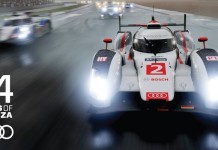The Audi TT 2.0 TDI’s sales success proves that dynamism and efficiency are not mutually exclusive. On the contrary, this modern combination appeals strongly to customers. Since its market launch in 2008, the proportion of Audi TT sports car sales accounted for by the 2.0 TDI version with 125 kW (170 hp) has risen steadily. This week the 10,000th of these highly efficient cars will leave the Audi assembly line.
The Audi TT Coupé 2.0 TDI quattro and Audi TT Roadster 2.0 TDI quattro are the world’s first series-production sports cars with a diesel engine. It’s a two-liter, four-cylinder unit with a power output of 125 kW (170 hp) and 350 Nm (258.15 lb-ft) of torque for dynamic propulsion. In the TT Coupé the TDI engine is content with a fuel consumption of 5.3 liters per 100 km (44.38 US mpg) – the lowest figure in the sports car segment of the market.
A major factor in the TT’s combination of high performance and pioneering efficiency is the body. It uses Audi Space Frame (ASF) technology, with a combination of lightweight aluminum at the front and pressed steel at the back of the car. This material mix helps to achieve well-balanced axle loads and keep the overall weight down to a very low figure. The body of the TT Coupé weighs only 206 kilograms (454.15 lb), made up of 140 kg (308.64 lb) of aluminum and 66 kg (145.5 lb) of steel.
Audi has now stepped up the pace with an effective blend of dynamic performance and low fuel consumption: after this product improvement the Audi TT is available with a new, extensively revised version of the 2.0 TDI engine. The TT Coupé now sprints from 0 to 100 km/h (62.14 mph) in 7.5 seconds and has a top speed of 226 km/h (140.43 mph), but with CO2 emissions of only 139 g/km (223.7 g/mile).







